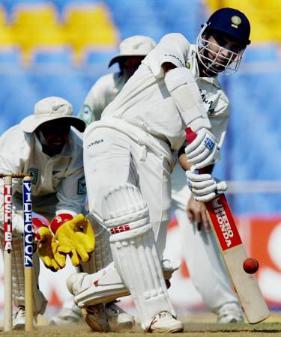
network of research and training centres/programmes
India vs. Pakistan in a tense test of cricket diplomacy
By Ramesh Thakur
 |
|
Indian captain Sourav
Ganguly in action: his team's fighting |
Now, to say that the India-Pakistan rivalry is fierce is an understatement. When India last visited Pakistan, for example, fans threw stones at the Indian players during the match in Karachi. And four years ago, Hindu militants dug up the pitch in New Delhi to protest against the Pakistani team's visit.
Given the troubled and sometimes violent history of cricketing relations in the subcontinent, among the most anxious spectators will be the two governments. The hope is that India's cricket tour of Pakistan will help bring together two nations who have fought three wars since they became independent from Britain in 1947.
Sports, after all, has always been an integral part of politics. The Romans recognised this in their gladiatorial contests. Hitler exploited the Berlin Olympics in 1936. And winning the rugby union World Cup in 1995 was a powerful boost to post-apartheid South Africa's triumphal return to the international sporting scene.
Australia and India recently concluded one of the most exciting series of Test cricket in memory. Written off on arrival by most commentators as a pushover despite their abundant talent, Indian captain Sourav Ganguly and his team ended the series with glowing testimonials to their fluent strokeplay, fighting spirit and good humour.
In this, the Indian cricketers symbolise the new India. Rich talent is married to burning ambition. No longer is India prepared to concede ground to anyone else. Instead, it is keen to take on the world and beat it at its own game on its home territory.
India's software industry is closely associated with the new "can do" spirit: isn't it wonderful to see the US seeking protection against newly competitive India? But clearly the spirit, the self-belief in victory and success, is proving to be infectious. India's youth see their future on the global stage; they are not content to survive behind the protective cocoon of home advantage.
The same phenomenon of risk-taking entrepreneurship has led New Delhi to approve the series with Pakistan on the eve of a general election in India in April-May. The decision in favour of the Indian team's tour of Pakistan was announced on February 15, just two days before officials began the initial round of exploratory peace talks in Islamabad.
The election strategy of the ruling Bharatiya Janata Party is to exploit the sense of wellbeing that is almost palpable in India these days.
The performance of the cricket team in Australia contributed to the "feel good" factor. Some cabinet ministers were worried that a terrorist attack on Indian cricketers on Pakistani soil, or a loss to Pakistan, would destroy the sense of wellbeing and self-confidence. Others argued that a tour would underscore the government's claim that cross-border terrorism had declined and India-Pakistan relations were being normalised.
Cancellation of the series, planned after a lapse of many years, would have inflicted a serious financial penalty on the country's cricket board. India's cricket-mad public (and betting industry?) was strongly in favour of the tour going ahead.
At the crucial meeting of BJP heavyweights on February 14, foreign affairs specialists were the ones voting yes, although reaching out to the sizeable Muslim vote must also have been a calculation. The announcement the next day made it clear that prime minister Atal Bihari Vajpayee's wishes had prevailed for the tour to proceed.
The Indian team can still collapse with a breathtaking suddenness that few others can match. And this, too, is a fit metaphor for the still wobbly state of the Indian economy. Complacency about the eventual outcome would be dangerous. But to the artistry, charm, impulsiveness and passion that is the traditional heritage of Indian cricket, the new generation of players brings application, self-belief, tenacity and determination that rejects resigned acceptance of whatever fate has willed.
Recalling the ping-pong diplomacy that helped to
normalise Sino-US relations, can relations between India and Pakistan be
normalised with some courageous cricket diplomacy? Now that would be a
fitting posthumous gift from the British Raj that left the subcontinent a
deeply divided legacy in the first place. is Senior Vice-Rector of UN University and
an avid Indian cricket fan. This commentary first appeared in the March 12 edition of
The Australian.
These are his personal views.
Copyright © 2004 United Nations University. All rights reserved.